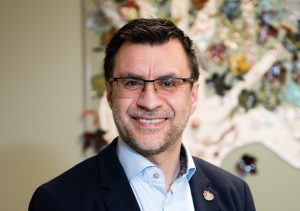Webinar: The psychiatric management of PTSD
Overview
The psychiatric management of PTSD is a three-part webinar series designed to provide participants with an understanding of the role medication plays in treating posttraumatic stress disorder (PTSD), emphasizing the significance of a personalized approach that addresses the distinct needs of the Veteran population.
Continue reading to learn more about this webinar series, including how to register.
Audiences
- Prescribers (e.g. medical doctors, psychiatrists, nurse practitioners)
Includes licensed medical professionals who are authorized to prescribe medications for the treatment of mental health disorders including PTSD.
- Non-prescribing mental health professionals (e.g. therapists, counsellors, social workers)
Includes professionals who provide psychological or therapeutic support to individuals with PTSD, but who do not prescribe medication.
- Veterans and their Family members
Includes Canadian Veterans who have been diagnosed with PTSD or are seeking to better understand its management, as well as their Family members who play a critical role in supporting the Veteran’s recovery.
Sessions
The psychiatric management of PTSD — for prescribers
This webinar will provide an in-depth look at medication-based PTSD treatments for Veterans. Prescribers will gain insights into medication classes, dosing, potential side effects and considerations unique to the Veteran population, including polypharmacy risks and co-occurring conditions. The webinar will also cover recent advancements in medication and other treatments to help prescribers make informed choices in managing PTSD symptoms effectively and compassionately.
Date: September 18, 2025
Time: 12:30 – 2 p.m., Eastern time
Location: Virtual
Language: English
Cost: No cost
Registration deadline (prescribers): September 16, 2025
The psychiatric management of PTSD — for non-prescribing professionals
Designed for non-prescribing professionals such as therapists and social workers, this webinar will explore how medication-based treatments can complement therapeutic interventions for PTSD. Participants will learn how to better support Veterans undergoing medication therapy, recognize effects medications can have on mood and behaviour and collaborate effectively with prescribers. This webinar highlights how a combined medication-based and therapeutic approach can provide a well-rounded, effective PTSD treatment plan.
Date: October 2, 2025
Time: 12:30 – 2 p.m., Eastern time
Location: Virtual
Language: English
Cost: No cost
Registration deadline (non-prescribing professionals): September 30, 2025
The psychiatric management of PTSD — for Veterans and Families
This webinar will provide Canadian Armed Forces and Royal Canadian Mounted Police Veterans and Families with accessible, practical knowledge about how medications and other forms of treatment can work to treat PTSD. The webinar will offer clarity on how medication-based treatments can aid recovery by helping Veterans and Families actively participate in the treatment process.
Date: October 9, 2025
Time: 3 – 4:30 p.m., Eastern time
Location: Virtual
Language: English
Cost: No cost
Registration deadline (Veterans and Families): October 7, 2025
Registration
Registration for this event has now closed. Please contact the implementation team if you have questions or would like to access the recording: implementation-atlas@theroyal.ca
Webinar details
Each webinar will consist of a 60-minute presentation by a clinical expert, followed by a 30-minute live Q&A session.
For prescribers: September 18, 2025, 12:30 – 2 p.m., Eastern time
For non-prescribing professionals: October 2, 2025, 12:30 – 2 p.m., Eastern time
For Veterans and Veteran Families: October 9, 2025, 3 – 4:30 p.m., Eastern time
About the presenters

Dr. Richardson is the Medical Advisor to the Atlas Institute for Veterans and Families, the Scientific Director of the MacDonald Franklin OSI Research Centre and a Consultant Psychiatrist at St. Joseph’s Operational Stress Injury Clinic. He holds the Tanna Schulich Chair in Neuroscience & Mental Health and is a Professor in the Department of Psychiatry at the Schulich School of Medicine & Dentistry, Western University. In addition, he is a Research Fellow with the Canadian Institute for Military and Veteran Health Research (CIMVHR).
With more than two decades of experience in the assessment and treatment of Canadian Armed Forces members and Veterans, Dr. Richardson is recognized as one of the foremost experts on military-related PTSD and other operational stress injuries. He has authored over 100 peer‐reviewed articles and book chapters. His research spans risk factors for PTSD and suicidal ideation, health care utilization, treatment outcomes, and the impact of PTSD on quality of life.

Polliann Maher is the Lived Expertise Lead, Families at the Atlas Institute for Veterans and Families. She is the spouse of a Veteran with posttraumatic stress disorder and brings to her role more than 20 years of lived experience in navigating the mental health system. Polliann is passionate about educating the Veteran community and sharing her knowledge of the resources that are available to them. She is a strong advocate around changes that encompass the Family, which are many times an afterthought or forgotten.

Brian McKenna served for 19 years in the Canadian Army, retiring as a Warrant Officer. In that time, he served in Bosnia twice, both as a signaller and then a section commander. Brian then deployed to Afghanistan twice, once with the Canadian Army and once again as a NATO counter-improvised explosive device instructor. While seeking medical treatment post-release, Brian joined with other Veterans in petitioning the government for the creation of a centre focused on Veteran and Family mental health issues, resulting in the establishment of the Atlas Institute. Brian currently serves as National Strategic Advisor, Veterans, for the Atlas Institute.
Eligibility requirements
The webinar series is designed for prescribers, non-prescribing professionals, Veterans and Veteran Family members interested in deepening their understanding of medication and other forms of treatment for PTSD and in enhancing their support for Veterans.
To register, you must:
- Be eligible under one of the three target audiences: Prescribers, non-prescribing professionals, Veteran/Veteran Family member.
- Be currently living and/or providing care in Canada.
- Be comfortable participating in English or using French captioning.
We encourage applications from members of groups with historical and/or current barriers to equity. The Atlas Institute is attentive to the diversity of our network and invites you to self-identify during registration if you wish. Responses from applicants who self-identify during the registration process will only be shared with training organizers at the Atlas Institute. These groups include:
- First Nations, Métis and Inuit Peoples
- Persons with visible and/or invisible (physical and/or mental) disabilities
- Members of a group(s) that commonly experience discrimination due to race, ancestry, colour, religion and/or spiritual beliefs, or place of origin
- Persons who identify as women
- Persons of marginalized sexual orientations, gender identities and gender expressions
The Atlas Institute is committed to providing an accessible environment for participants attending webinars. Part of this commitment includes offering closed captioning on the video components of the webinar.
October 2, 2025
October 9, 2025